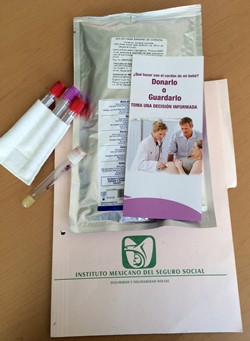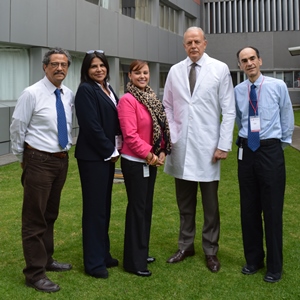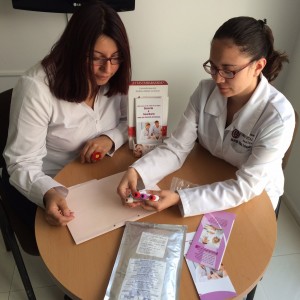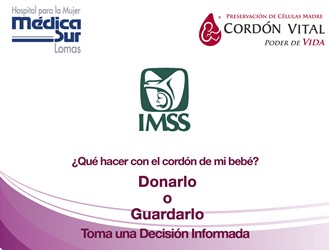You are here
Donate or Save - Take an Informed Decision
 We report on a pioneer program in México City designed to educate expectant mothers about both cord blood donation and private storage, made possible by the cooperation, to mutual benefit, of public and private institutions.
We report on a pioneer program in México City designed to educate expectant mothers about both cord blood donation and private storage, made possible by the cooperation, to mutual benefit, of public and private institutions.
Cordón Vital, a private (family) cord blood bank active in México City since 2001, together with Médica Sur Lomas Woman's Hospital, a private obstetric hospital (formerly Hospital Santa Teresa), formed an alliance in April 2007 with the public cord blood bank of the México Social Security Institute (IMSS) that was founded in 2005.
These three institutions launched a program called Donate or Save (Donarlo o Guardarlo) your newborn's cord blood. The alliance developed educational materials that encouraged new mothers to take an informed decision on the three options: Donate cord blood to a public bank, Save it in a family bank, or discard it.
The public bank IMSS contributed training to the medical and paramedical staff of the hospital, as well as the materials required for the assessment of donors and the collection of cord blood. The private bank Cordón Vital contributed the development and printing of the educational material, and coordinated the logistical and educational aspects of the program. This included the control of files and collection kits, the shipping and delivery to the IMSS cord blood bank, as well as additional education efforts with all participants in the chain of patient care. Médica Sur Lomas participated in the distribution of the educational material among their patients, the promotion of the altruistic donation among their pregnant patients and health professionals, and allowed the use of their facilities.
Figure on the left shows the program heads from left to right: Dr. Angel Guerra, QFB Ruth Contreras, LAE Adriana Rivera, Dr. Jorge Kunhardt, and Ted Goldberg.
Figure on the right shows a mother going through assessment.
Between April 2007 and December 2012, 1264 expectant mothers who agreed to take part in the program (by signing an informed consent) were evaluated; and 800 units of cord blood from mothers who met the selection criteria were collected. Only 100 units were successfully cryopreserved and validated for their clinical use in transplantation at the IMSS centers. The remaining 700 collected units were not cryopreserved nor validated due to: incomplete medical records, lack of signature from the (collecting) physician responsible for the patient, insufficient volume collected (threshold volume was 80 ml) or insufficient cellularity (threshold TNC was 800 million).
Since then, out of the 100 successfully stored cord blood donations, 8 have been used for transplant: 6 for patients diagnosed with Acute Lymphoblastic Leukemia (3 children and 3 adults); 1 for a patient with Severe Aplastic Anemia; and 1 for a patient with Myelodysplastic Syndrome. Currently 2 more units have been found compatible with patients in need and are being evaluated for transplant.
According to annual reports from the World Marrow Donor Association (WMDA), the public cord blood bank of La Raza National Medical Center of the Méxican Institute for Social Security (IMSS) has been for the last few years among the top five banks world wide with the highest utilization rate of stored donations. Today, the IMSS cord blood bank provides service to seven IMSS transplant centers.
During the Donate or Save education campaign, both the public bank IMSS and the private bank Cordón Vital saw an increase in their enrollment from the participating hospital Médica Sur Lomas. This goes to show that when public and private cord blood banks work together towards better education of expectant parents, everyone benefits.
In January 2013, the General Health Law in México was amended by the Health Ministry to promote that all (public and private) Obstetric Attention Centers / Maternity Clinics must ask all pregnant women to consider donating their newborn's cord blood. For this reason, the three partner institutions, IMSS, Cordón Vital, and Médica Sur Lomas, are revising their education program in order to improve some aspects that may decrease the rejection rate of the donated units. The new slogan will be: "Your Newborn's Cord Blood - Take an informed decision".





 Participants
Participants